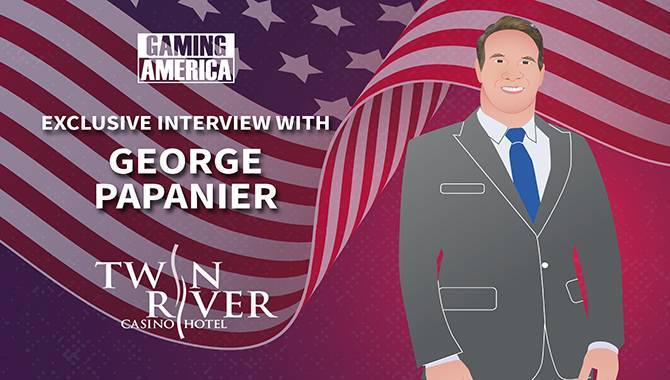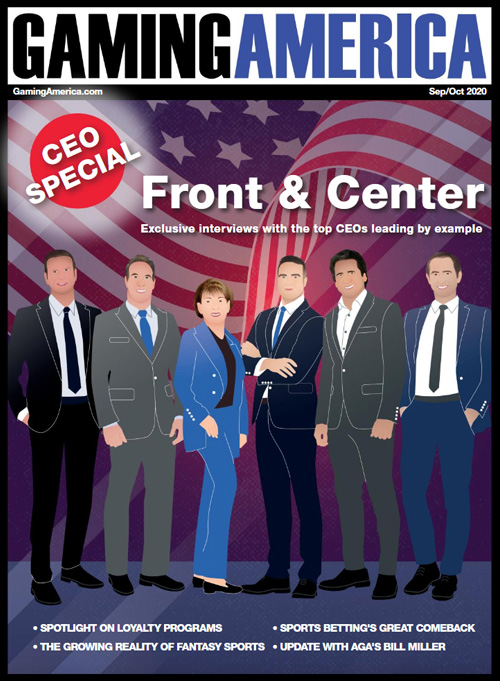
George Papanier can still recall the excitement of the first casinos arriving in Atlantic City in the late 1970s. As a college student at nearby Rowan University, he witnessed
his region of the country explode with excitement when Resorts International opened its doors and ushered in a new era of gaming in the United States.
Papanier tells Gaming America: “I had to be a part of the industry that was transforming Atlantic City, so I applied and was offered a finance position during the construction
phase of the Sands Hotel and Casino. Properties were opening so fast that they created a vacuum for talent that my skill set was able to fill.”
Papanier rode the initial Atlantic City casino wave into a four-decade career that has spanned the continent, taking him to places as disparate as Colorado and Louisiana. He eventually returned home to the northeast corridor but not before picking up a wealth of experience that drives his decision making as CEO for Twin River Worldwide Holdings (TRWH).
To better understand how Papanier rose to his present position, it’s imperative to start at the beginning. He was born in Philadelphia and grew up in the shadow of the now-demolished Veterans Stadium. Not surprisingly, he became a huge Eagles fan. Papanier’s parents instilled in him qualities necessary for a good leader: levelheadedness
and a firm belief in yourself.
“My role models were my mother and father, who were two completely different people with different philosophies on life,” Papanier says. “My mother is direct and had no problem giving her opinion and my father always guided me through his actions. At an early age, my father taught me that you cannot be driven entirely by emotion and need to utilize the best tools available and deploy tactics that are fact-based in order to elevate your chances of success – something I have carried through life with me.”
Papanier then went off to college “with the sole purpose of guaranteeing that I would be employable upon graduation” as he puts it. Adjunct professors with hands on experience in the business world fueled his interest in finance, and he left Rowan with a CPA in hand. “It was the basis for my moving quickly to a CFO position in gaming, which became the foundation for my current role as CEO,” he says.
We can’t be afraid to evolve through innovation, technological advances and engagement with new platforms like sports betting and online gaming.
After beginning his career with Sands Hotel and Casino, Papanier diversified his resume by working in an executive finance position for Trump Plaza Hotel and Casino in Atlantic City and then serving in executive operations roles for Hemmeter Enterprises in Colorado. He moved on to CFO positions for Sun International Hotels Limited in the Bahamas and Mohegan Sun Casino in Uncasville, CT, before returning to Atlantic City in the late 90s as COO of Resorts Casino Hotel.
By the early 2000s, Papanier had solidified himself as a rising COO, first for Peninsula Gaming and then for TRWH from 2004 to 2011. The early years of his TRWH tenure included turning Lincoln Park from a Dog Track with video lottery terminals
into one of Rhode Island’s premier casino hotels. The work, while fruitful, was far from glamorous.
“We completed the Twin River transformation, unfortunately, just in time to enter the Great Recession in 2008 and although profitable, we could not avoid the triggering of loan covenants and entered into a pre-packaged bankruptcy where I had the unenviable
role of debtor in possession,” Papanier says. “I helped navigate us through the restructuring process and was promoted to CEO upon emergence from bankruptcy. So, with an improved balance sheet, we put ourselves in a position to create considerable
value for our shareholders.”
Papanier says he leaned on his Atlantic City connections to bring in experienced talent that matched the company’s aggressive marketing strategy. In a matter of years, TRWH went from a regional business with one core asset, Twin River, into a company with EBITDA that grew more than 240% by 2018. Papanier proudly recalls, “Our success in the highest-taxed jurisdiction in North America reflects the diversity of operational capabilities our organization possesses when compared to Hard Rock Biloxi, which
has experienced success in a relatively low-tax jurisdiction and received numerous awards, including being voted the best run of all Hard Rock Casinos by Hard Rock Management as recently as 2017 and 2018.”
In the first half of 2020, TRWH took its biggest step yet in expanding its US footprint. The company acquired three Colorado casinos from the subsidiary of Affinity Gaming
for a cool $51m. When Eldorado Resorts put the Isle of Capri in Kansas City, Missouri, and Lady Luck Casino in Vicksburg for sale amid its acquisition of Caesars, TRWH snatched them for $230m. Along with planned acquisitions in New Jersey, Nevada and Louisiana, the company will soon operate a dozen properties across eight states.
“On our recent M&A activity, we look forward to executing our development and operating plans for our newly acquired Kansas City and Vicksburg properties, and expect our Bally’s AC acquisition to close in mid-to-late Q4 2020, with Shreveport and Mont Bleu likely closing in the first half of 2021,” Papanier says. “Finally, we continue to focus on returning to pre-COVID levels of revenue as we head into 2021.”
My role models were my mother and father, who were two completely different people with different philosophies on life. My mother is direct and had no problem giving her opinion and my father always guided me through his actions.
The looming acquisition of Bally’s gives TRWH crucial access into the New Jersey online market, which has exploded in recent months. In August, the company awarded the first of its online skins to Sporttrade and theScore, choosing to go with two up-and-coming startups over more traditional players. Sporttrade will give TRWH entry into a first-of-its-kind sports betting exchange, while theScore offers online gaming and an online casino.
“We can’t be afraid to evolve through innovation, technological advances and engagement with new platforms like sports betting and online gaming,” Papanier says.
TRWH isn’t afraid to partner with big brands, either. In Colorado, the company signed a market access agreement with FanDuel back in January months before the state officially launched regulated sports betting. Though the coronavirus initially held down wagers in the Rocky State, by July Colorado reported $5m in sports betting revenue.
The pandemic took off after TRWH had agreed to its early 2020 acquisitions, but didn’t stop the company from pursuing the Eldorado pickups, either. “The situation with COVID in the US really came on quickly,” Papanier says. “We had obviously heard of the impacts in Macau, and it began to pop up on the radar in the US in early March, but we did not fully appreciate the impact this was going to have until events occurred like the NBA cancelling its season and we received a closure notice in Rhode Island. Luckily, we were well positioned when it happened, as we have continuously taken proactive steps to ensure that we were well prepared for an event like this, financially speaking.”
Though the coronavirus was incomparable in size and scope, Papanier spent four decades preparing for the type of crisis that would unfold across the industry. He credits his gaming career adversity for providing a wealth of knowledge he could draw on this spring and summer. “Throughout my career, I have learned the most from circumstances outside my control,” he says. “For example, the promotional wars in the 1980s in AC drove my support of rational targeted marketing spend; managing through the internet bubble taught me the need to operate efficiently; and the impact of 9/11 taught me the need to be adaptable to market fluctuations and how to deploy reactive tactics to competition.”
Papanier would be the first to say his success as TRWH’s CEO is the product of the structure around him more than any one person. He prefers to spread out tasks rather than consolidate, and with a business that now spans much of the continent, his is a strategy that appears built to suit the company well.
“I purposefully created a broad organizational structure, which we have built on as we acquire properties, and intentionally put the organization in a position to execute an aggressive diversification strategy prior to going public in 2019 so that our current structure has the experience and bandwidth to support our continued growth,” he says. “All this set the stage for the growth and value creation that you see today as a company that owns and manages nine casinos in five states and with three pending acquisitions
in three states.”
The value system that underlies much of Papanier’s decision rests on loyalty and authenticity. He is a believer in being loyal to those he surrounds himself with, while expecting a commitment to excellence in return. During times of struggle, he returns to a favorite line he learned from TRWH CMO Phil Juliano on “being what you are and
not what you are not.”
I love the exciting nature of the business and how it incorporates all aspects of entertainment and leisure, including not only casino-style gambling, but also bars and restaurants, hotels, banquets and convention facilities, live concerts and shows, sports betting, horse racing, live boxing and MMA fights. There’s something for everyone.
“I am guided by a few fundamentals and one overriding philosophy based on an understanding of our industry and the nuances of each market we operate in,” Papanier says. “I have always prioritized customer satisfaction, taking care of our employees, providing value to shareholders and supporting the communities that we operate in.
My overriding philosophy stems from a quote from Bill Marriott, who said, 'Make the decision to make a decision.'
We have to always be in a position to react to competition and I empower those in my organization at all levels to have the latitude to make decisions.” Making the proper decisions is more paramount than ever as TRWH seeks to bounce back in H2 2020 and into 2021. The company is tasked with a long list of challenges, from safely reopening its current casinos to efficiently completing the integration of its recent acquisitions, all during an unceasing pandemic. The roadmap, though tricky, could lead to an attractive destination by this time next year.
At present, Papanier is insistent on maintaining safety and integrity among his company and the consumers they serve. The quickest way to gain the trust of casino-goers
is to show properties can reopen while prioritizing the health of people inside them. “As we continue to operate under capacity restrictions and with limited amenities, consumer confidence is going to be key to the economic recovery,” Papanier says. “From the moment we closed our properties, we started working on a detailed and comprehensive reopening plan. We have been working very closely with state and local officials, as well as public health experts to deliver a safe environment for everyone, and are thrilled to have welcomed back our valued team members and loyal customers at all of our properties that meet or exceed CDC safety guidelines.”
When Papanier looks back on what he’s been able to experience and create in the gaming industry, he can’t help but return to his wide-eyed younger self eager to take part in the fun of late 1970s Atlantic City. The same energy that attracted him to the job keeps him going today.“I love the exciting nature of the business and how it incorporates all aspects of entertainment and leisure, including not only casino-style gambling, but also bars and restaurants, hotels, banquets and convention facilities, live concerts and shows, sports betting, horse racing, live boxing and MMA fights,” Papanier says. “There’s something for everyone.”

